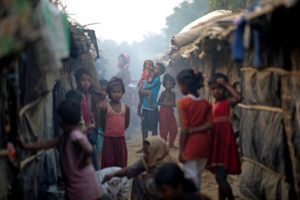Although a genocide designation shouldn’t matter, since a country’s responsibilities to protect innocent civilians should be triggered whenever and wherever mass atrocities are under way, it does matter legally. The Genocide Convention requires signatories to take stronger punitive measures when the intent to annihilate or wipe out a particular group is present. Given America’s increasingly hands-off approach to foreign affairs that don’t directly implicate top national interests, it is not surprising that the U.S. has avoided labeling the atrocities perpetrated against the Rohingya as genocide.
For one thing, not calling out the Tatmadaw’s actions for what they truly are amounts to indirectly sanctioning the behavior. Bad actors the world over are watching closely to see how the Trump Administration reacts to atrocities. Inaction in the face of crimes against humanity and genocide gives bad people license to continue to do bad things. Even within Myanmar, other minority groups, including the Kachin, Karen, Chin, and Shan face comparable discrimination and are at grave risk of being subjected to persecution and atrocities like the Rohingya. Beyond Myanmar, Saudi Arabia is unapologetically murdering dissidents and indiscriminately bombing civilian infrastructure, school buses, weddings and markets. The more the U.S. retreats from its long-held position as global leader in the fight to uphold human rights and democracy, the more leeway bad actors will feel to commit atrocities with impunity.
The U.S. can no longer stand idly by in the face of genocide. The Trump Administration used Secretary of State John Kerry’s genocide determination in the case of ISIS’s actions against Yazidis in Iraq and Syria to create its Genocide Recovery and Persecution and Response Program. But was this just because Iraqi Christians were also harmed?But for the presence of this constituency — which, by the way, was not targeted for genocide in the way the Yazidis were — would the Trump Administration do nothing to counter impunity and stabilize these communities? This type of piecemeal intervention, where we pick and choose what crisis to intervene in by the political opportunity it represents is absolutely antithetical to the very core of the human rights principles upon which this country was founded and which it has historically championed.
Whether we want the responsibility or not, the United States sets the tone for how much of the world responds to egregious human rights abuses. If we want to burden-share and get other countries involved in prevention, humanitarian response and stabilization efforts,we need to take the lead, rather than throw money at the problem late in the game and then complain about other countries’ failure to contribute. Our involvement right now may be more needed than ever, as Rohingya in the camps in Bangladesh face the terrifying spectre of forced return back to Myanmar.
[maxbutton id=”23″]
Please contact your Representative immediately and ask them to vote YES on H.R. Res. 1091. Help send a powerful message to our government to step up its response to this ongoing genocide by drawing upon the full panoply of its diplomatic tools. It is imperative that the United States push Myanmar to not only guarantee safe and voluntary returns, but also to hold perpetrators accountable, and begin the difficult process of reversing the dangerous laws and policies that have allowed for religious nationalism to take on such a terrifying form. You can also call upon your senators to support The Burma Human Rights and Freedom Act of 2018 (S. 3696). Introduced on Monday, the bill resuscitates legislation originally authored by the late John McCain and Sen. Ben Cardin (D-MD), which was blocked from the Senate floor by Senate Majority Leader Mitch McConnell, a longtime supporter of Burma’s disgraced civilian leader Aung San Suu Kyi. Senators Cardin and Todd Young (R-IN), along with Dick Durbin (D-Ill), Marco Rubio (R-FL), and Jeff Merkley (D-OR), are using the last few weeks of this session of Congress to breathe new life into the bill, leading a bipartisan Senate group that is seeking to impose targeted sanctions and travel restrictions on senior Burmese military officials as a means of achieving accountability and pushing for safe, voluntary, and dignified return of the Rohingya to their homeland. Although this legislation will likely not hit the Senate floor before this Congress wraps up, its re-introduction sends a poignant message that a growing number of influential, bipartisan lawmakers demand a genocide determination as well as deeper US engagement on addressing this unconscionable and protracted crisis.


